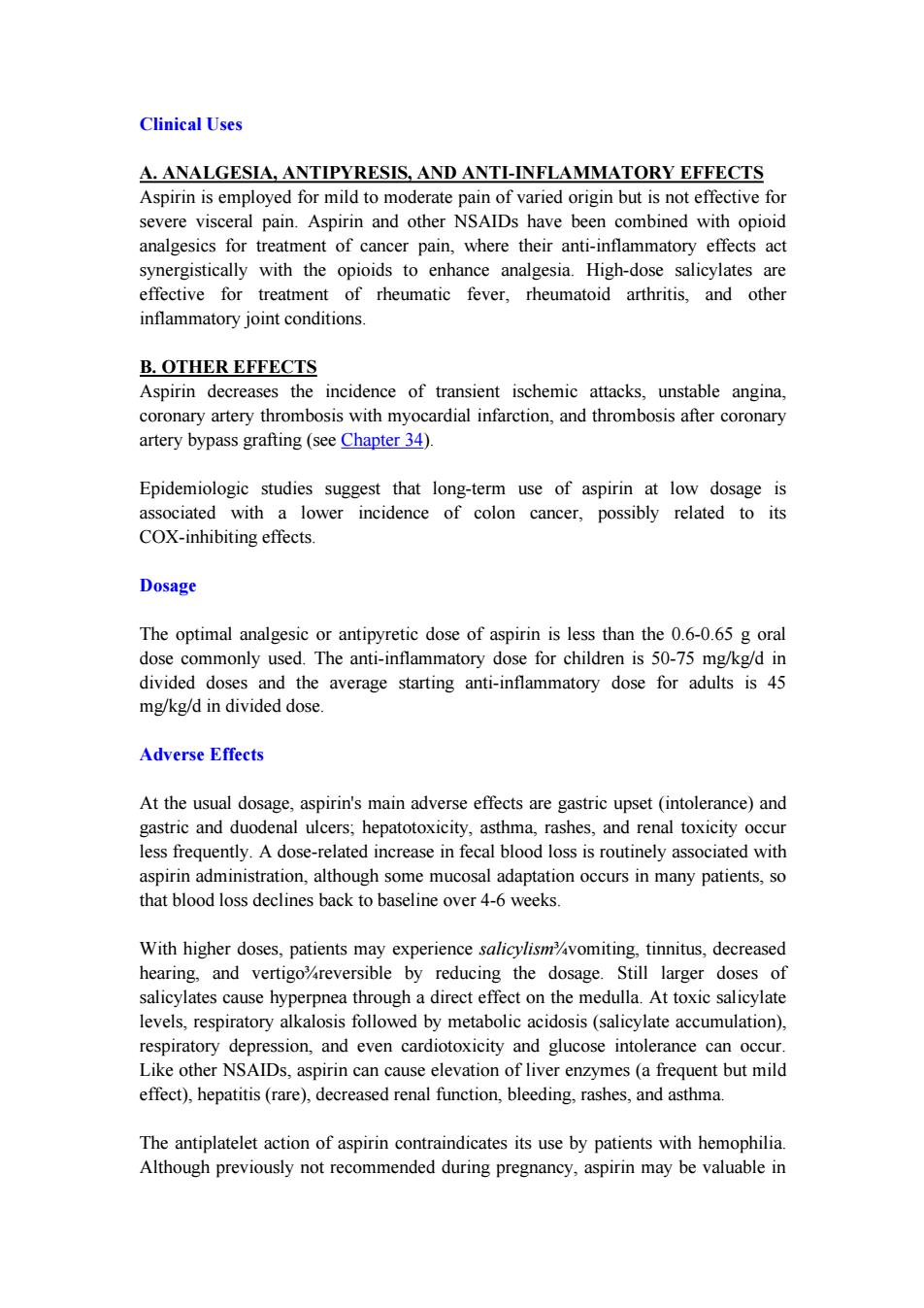正在加载图片...

Clinical Uses A.ANALGESIA,ANTIPYRESIS,AND ANTI-INFLAMMATORY EFFECTS Aspirin is employed for mild to moderate pain of varied origin but is not effective for severe visceral pain.Aspirin and other NSAIDs have been combined with opioid analgesics for treatment of cancer pain,where their anti-inflammatory effects act synergistically with the opioids to enhance analgesia.High-dose salicylates are effective for treatment of rheumatic fever,rheumatoid arthritis,and other inflammatory joint conditions. B.OTHER EFFECTS Aspirin decreases the incidence of transient ischemic attacks,unstable angina, coronary artery thrombosis with myocardial infarction,and thrombosis after coronary artery bypass grafting(see Chapter 34). Epidemiologic studies suggest that long-term use of aspirin at low dosage is associated with a lower incidence of colon cancer,possibly related to its COX-inhibiting effects. Dosage The optimal analgesic or antipyretic dose of aspirin is less than the 0.6-0.65 g oral dose commonly used.The anti-inflammatory dose for children is 50-75 mg/kg/d in divided doses and the average starting anti-inflammatory dose for adults is 45 mg/kg/d in divided dose. Adverse Effects At the usual dosage,aspirin's main adverse effects are gastric upset (intolerance)and gastric and duodenal ulcers;hepatotoxicity,asthma,rashes,and renal toxicity occur less frequently.A dose-related increase in fecal blood loss is routinely associated with aspirin administration,although some mucosal adaptation occurs in many patients,so that blood loss declines back to baseline over 4-6 weeks. With higher doses,patients may experience salicylismvomiting,tinnitus,decreased hearing,and vertigoreversible by reducing the dosage.Still larger doses of salicylates cause hyperpnea through a direct effect on the medulla.At toxic salicylate levels,respiratory alkalosis followed by metabolic acidosis(salicylate accumulation). respiratory depression,and even cardiotoxicity and glucose intolerance can occur. Like other NSAIDs,aspirin can cause elevation of liver enzymes (a frequent but mild effect),hepatitis(rare),decreased renal function,bleeding,rashes,and asthma. The antiplatelet action of aspirin contraindicates its use by patients with hemophilia. Although previously not recommended during pregnancy,aspirin may be valuable inClinical Uses A. ANALGESIA, ANTIPYRESIS, AND ANTI-INFLAMMATORY EFFECTS Aspirin is employed for mild to moderate pain of varied origin but is not effective for severe visceral pain. Aspirin and other NSAIDs have been combined with opioid analgesics for treatment of cancer pain, where their anti-inflammatory effects act synergistically with the opioids to enhance analgesia. High-dose salicylates are effective for treatment of rheumatic fever, rheumatoid arthritis, and other inflammatory joint conditions. B. OTHER EFFECTS Aspirin decreases the incidence of transient ischemic attacks, unstable angina, coronary artery thrombosis with myocardial infarction, and thrombosis after coronary artery bypass grafting (see Chapter 34). Epidemiologic studies suggest that long-term use of aspirin at low dosage is associated with a lower incidence of colon cancer, possibly related to its COX-inhibiting effects. Dosage The optimal analgesic or antipyretic dose of aspirin is less than the 0.6-0.65 g oral dose commonly used. The anti-inflammatory dose for children is 50-75 mg/kg/d in divided doses and the average starting anti-inflammatory dose for adults is 45 mg/kg/d in divided dose. Adverse Effects At the usual dosage, aspirin's main adverse effects are gastric upset (intolerance) and gastric and duodenal ulcers; hepatotoxicity, asthma, rashes, and renal toxicity occur less frequently. A dose-related increase in fecal blood loss is routinely associated with aspirin administration, although some mucosal adaptation occurs in many patients, so that blood loss declines back to baseline over 4-6 weeks. With higher doses, patients may experience salicylism¾vomiting, tinnitus, decreased hearing, and vertigo¾reversible by reducing the dosage. Still larger doses of salicylates cause hyperpnea through a direct effect on the medulla. At toxic salicylate levels, respiratory alkalosis followed by metabolic acidosis (salicylate accumulation), respiratory depression, and even cardiotoxicity and glucose intolerance can occur. Like other NSAIDs, aspirin can cause elevation of liver enzymes (a frequent but mild effect), hepatitis (rare), decreased renal function, bleeding, rashes, and asthma. The antiplatelet action of aspirin contraindicates its use by patients with hemophilia. Although previously not recommended during pregnancy, aspirin may be valuable in